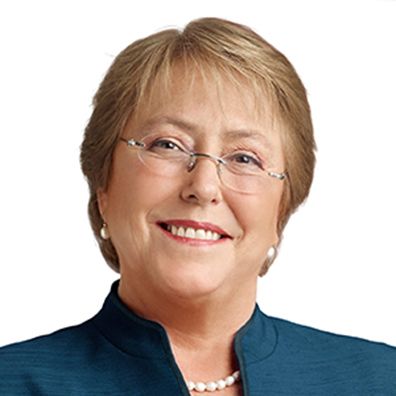Michelle Bachelet
Chile
Politician, Doctor, President of Chile
DAAD Scholarship 1978

Michelle Bachelet
© Campana CC-by-sa 30 cl
“I unite all of Chile’s deadly sins within me,” says Michelle Bachelet, who between March 2006 and March 2010 was the first woman to hold the office of President in Chile, the Andes republic that is regarded as strictly Catholic and conservative. On 15 December 2013, she won the presidential election for a second time and has been in office since 11 March 2014. However, the path that took the atheist, who has three children from two different fathers, and made her the first woman in the state is only surprising at first glance. In electing Michelle Bachelet back in 2006, many, and above all younger Chileans, expressed their wish for a more modern society. Bachelet is regarded as charismatic, popular with the people, and able to assert herself. She describes her approach to politics as follows: “I know how important it is to implement major ideas tangibly, practically and realistically.” Although Bachelet was already extremely popular during her first term of office, the Chilean constitution does not permit immediate re-election. In September 2010, Michelle Bachelet became Under-Secretary-General of the United Nations and Executive Director of UN Women, the recently established United Nations entity that promotes gender equality and the empowerment of women. For a long time, she did not make it clear whether she would return to politics, only announcing in March 2013 that she intended to stand for president. During her election campaign, Bachelet – a socialist – committed herself to reforming the education and tax systems, and to introducing a new constitution. In summer 2015, she responded to student protests by announcing that higher education would be free for more than half of the students.
The wounds and scars of the dictatorship will remain forever, and we have to learn to live with them.
– Michelle Bachelet
Michelle Bachelet was born in Santiago de Chile in 1951 as the daughter of an air force general, Alberto Bachelet, and an archaeologist, Angela Jeria, and grew up in various army camps throughout the country. Later, she joined the Socialist Youth organisation and became a committed student leader. She experienced the military coup of September 1973 from the roof of the university’s medical faculty. Her father, who refused to disavow Salvador Allende, was tortured and died soon afterwards as a result. In January 1975, the secret service abducted Michelle and her mother to the infamous Villa Grimaldi, where they were brutally interrogated. However, Socialist functionaries succeeded – with the help of foreign governments – in exerting so much pressure on the regime that it allowed Michelle and her mother to leave the country. The two women fled via Australia to East Germany.
The same year saw Bachelet begin studying German in Leipzig. Later, she married the Chilean architect Jorge Dávalos, the father of the two older children, and then continued her medical studies at Humboldt-Universität Berlin. What she cherishes about her stay in Germany was how she was able to open up to an alien society: “I got to know the value of work and efficiency.” After four years in Germany, Michelle Bachelet and her family returned to Chile in 1979, where three years later she completed her studies as a surgeon, specialising as a paediatrician.
After Pinochet’s fall in 1990, she became actively involved in organisations representing the relatives of the victims of the dictatorship. She worked at the health ministry between 1994 and 1997, until President Lagos finally appointed her as Health Minister in 2000. In 2002 – Bachelet had attended seminars on strategy and security policy in Santiago and Washington in the mid-1990s – she, the socialist daughter of a murdered general, took on responsibility for the Chilean armed forces. Quickly, and in the face of many adversities, she gained their respect and succeeded in decisively shedding light on the human rights violations committed during the dictatorship.